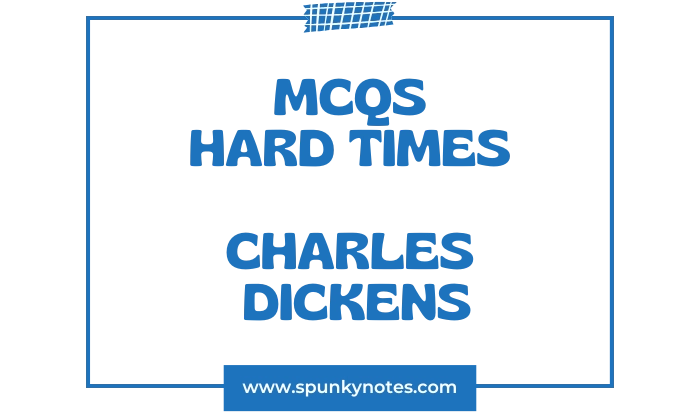

Estimated Reading Time: 19 min
Hard Times MCQs
1. What is the “one thing needful” Mr. Gradgrind demands in education?
A. Imagination
B. Facts
C. Creativity
D. Emotional intelligence
2. How is Mr. Gradgrind’s appearance described?
A. A round face and soft voice
B. A square forefinger, square forehead, and hard-set mouth
C. Long, flowing hair and gentle eyes
D. A frail body and quiet demeanor
3. What analogy describes the children ready to receive facts?
A. Empty canvases waiting for paint
B. Little vessels ready for facts to be poured into them
C. Wild animals needing taming
D. Delicate flowers needing gentle care
4. How does Mr. Gradgrind mentally introduce himself?
A. A man of art and sentiment
B. A man of realities, facts, and calculations
C. A man of great generosity
D. A man of boundless curiosity
5. What is Mr. Gradgrind compared to when ready to fill children with facts?
A. A gentle spring shower
B. A cannon loaded with facts, ready to blow them out of childhood
C. A beacon of hope
D. A quiet scholar
6. What name does Mr. Gradgrind insist “Girl number twenty” use instead of Sissy?
A. Sarah
B. Cecilia
C. Clara
D. Susan
7. What is Sissy Jupe’s father’s objectionable occupation?
A. A factory worker
B. A horse-riding performer
C. A schoolmaster
D. A doctor
8. Who does Mr. Gradgrind call upon to define a horse when Sissy cannot?
A. Thomas Gradgrind Jr.
B. Louisa Gradgrind
C. Bitzer
D. Mr. M’Choakumchild
9. What is Bitzer’s precise definition of a horse?
A. A common beast of burden.
B. Quadruped, Graminivorous, forty teeth…
C. An animal used for transportation.
D. A large mammal with a mane and tail.
10. How is Bitzer’s appearance described in contrast to Sissy Jupe’s?
A. Dark-eyed and dark-haired, with radiant color.
B. Light-eyed and light-haired, appearing to bleed white if cut.
C. Robust and healthy.
D. Cheerful and full of life.
11. According to the gentleman, what is “Taste” another name for?
A. Imagination
B. Fancy
C. Fact
D. Sentiment
12. What word does the gentleman insist must be discarded and replaced by “Fact”?
A. Reality
B. Truth
C. Fancy
D. Knowledge
13. Mr. M’Choakumchild and other schoolmasters are described as being turned out like so many what?
A. Soldiers
B. Pianoforte legs
C. Books
D. Machines
14. What subjects are listed as being at the ends of Mr. M’Choakumchild’s fingers?
A. Poetry and literature
B. Orthography, etymology, syntax, prosody, and many others.
C. Fine arts and philosophy
D. Emotional development and moral reasoning
15. What is the schoolroom described as, reflecting Mr. Gradgrind’s philosophy?
A. A vibrant learning environment
B. A plain, bare, monotonous vault
C. A place of creative exploration
D. A warm and welcoming space
16. How many young Gradgrinds are there?
A. Three
B. Four
C. Five
D. Six
17. What is the name of Mr. Gradgrind’s matter-of-fact home?
A. Fact House
B. Coketown Villa
C. Stone Lodge
D. Grand Grinding Hall
18. What sound invaded Mr. Gradgrind’s ears on the outskirts of town?
A. The quiet hum of machinery
B. Music from Sleary’s Horse-riding
C. The lamentations of the póor
D. The rustling of leaves
19. What shocking sight stopped Mr. Gradgrind at the circus booth?
A. His children, Louisa and Thomas, peeping at the circus
B. Mr. Bounderby engaged in idleness
C. Sissy Jupe running away
D. A group of workers on strike
20. What emotion does Louisa express when questioned by her father?
A. Excitement and joy
B. Jaded sullenness, with a starved imagination
C. Deep remorse and fear
D. Eagerness to please her father
21. What name does Mr. Gradgrind repeatedly invoke in his indignation?
A. Mr. M’Choakumchild
B. Mr. Bounderby
C. Mr. Sleary
D. Mr. Harthouse
22. How is Mr. Bounderby described in relation to Mr. Gradgrind?
A. His philosophical adversary
B. As near being his bosom friend as a man devoid of sentiment can be
C. His distant relative
D. His business rival
23. What is Mr. Bounderby’s boast about his mother?
A. She was a saintly woman.
B. She was highly educated.
C. She “bolted” and left him.
D. She was a factory worker.
24. How did Josiah Bounderby learn his letters and tell time?
A. From district schools and model schools.
B. From shop signs and a church clock, under a drunken cripple.
C. From private tutors.
D. From his mother.
25. What does Mr. Bounderby claim the “Hands” of Coketown want?
A. Plain bread and water
B. Turtle soup and venison with a gold spoon
C. Simple, wholesome food
D. Whatever the cheapest market offers
26. What does Louisa do after Mr. Bounderby kisses her?
A. She happily accepts it.
B. She rubs her cheek until it was burning red.
C. She tells him off angrily.
D. She laughs in amusement.
27. What are the key features of Coketown’s appearance?
A. Bright, colorful buildings and clean rivers.
B. Unnatural red brick, smoke serpents, and a purple, ill-smelling river.
C. Green parks and wide, open spaces.
D. Historical architecture and quaint streets.
28. How are the inhabitants of Coketown described?
A. Diverse and individualistic.
B. Equally like one another, doing the same work every day.
C. Constantly striving for uniqueness.
D. Separated by vast social differences.
29. What fundamental principle governs everything in Coketown?
A. Imagination
B. Fact
C. Morality
D. Sentiment
30. What did tabular statements show about the Coketown people?
A. They were always working.
B. They got drunk and, when not, they took opium.
C. They were highly moral and industrious.
D. They were easily satisfied with their lives.
31. How were the Coketown people perceived by Gradgrind and Bounderby?
A. As grateful and content.
B. As a bad lot, restless, unthankful, and unmanageable.
C. As highly reasonable and self-sufficient.
D. As ambitious and striving for improvement.
32. What does Sissy carry in a bottle for her father?
A. Water
B. Wine
C. The nine oils
D. Medicine
33. What is the name of the public-house where Sissy’s father lives?
A. The Three Jolly Bargemen
B. The Pegasus’s Arms
C. The Green Dragon
D. The Golden Lion
34. What does Mr. Childers reveal about Sissy’s father?
A. He has found a new job.
B. He has been “goosed” and has deserted his daughter.
C. He is ill and unable to perform.
D. He has gone to London for a new act.
35. What cut Signor Jupe deeper than his failures?
A. The public’s disapproval.
B. Knowing his daughter knew of his failures.
C. The loss of his dog.
D. The financial hardship.
36. What proposal does Mr. Gradgrind make to Sissy?
A. To offer her a place in the circus.
B. To educate her, on condition she breaks ties with circus friends.
C. To send her to a workhouse.
D. To find her father.
37. What is Mrs. Sparsit’s social standing?
A. She is of humble origins.
B. She is highly connected, with a great aunt Lady Scadgers.
C. She is a self-made woman.
D. She is a former factory worker.
38. What does Mrs. Sparsit’s “Coriolanian nose” suggest?
A. Timidity and shyness
B. Seriousness, sternness, and judgment
C. Gaiety and humor
D. Weakness and indecision
39. What does Mr. Gradgrind tell Louisa when he overheard her say “I wonder”?
A. That’s a good question.
B. Louisa, never wonder!
C. Wonder is the beginning of knowledge.
D. Tell me what you wonder about.
40. What is Sissy’s “absurd answer” about the first principle of Political Economy?
A. Supply and demand.
B. To do unto others as I would that they should do unto me.
C. Every man for himself.
D. Facts alone are wanted in life.
41. What was Sissy’s “mistake” regarding National Prosperity?
A. She didn’t know the exact figures.
B. She couldn’t know if it was prosperous without knowing who had the money.
C. She believed it was not prosperous.
D. She failed to define the term.
42. What does Sissy say was “nothing” regarding the percentage of people killed on voyages?
A. The percentage itself
B. The number of people saved
C. The suffering of the survivors
D. “Nothing… to the relations and friends of the people who were killed.”
43. What does Tom wish he could do with all the “Facts” and “Figures”?
A. Compile them into a book.
B. Put gunpowder under them and blow them all up.
C. Use them to gain power.
D. Present them to Parliament.
44. What new role has Time hustled Mr. Gradgrind into?
A. A factory manager
B. Member of Parliament for Coketown
C. A school inspector
D. A renowned philosopher
45. What is Louisa the subject of, according to her father?
A. A new educational program.
B. A marriage proposal from Mr. Bounderby.
C. A scientific experiment.
D. A philosophical debate.
46. How does Mr. Gradgrind advise Louisa to consider the marriage?
A. From an emotional perspective.
B. Simply as one of tangible Fact.
C. With an open heart.
D. Based on love and affection.
47. When Louisa says “Fire bursts out, father!” what is she hinting at?
A. The danger of industrial fires.
B. The suppression of human passions that will eventually erupt.
C. The beauty of the industrial landscape.
D. A literal fire.
48. What was Mr. Bounderby’s “first disquietude” on hearing of his happiness?
A. How to tell Mr. Gradgrind.
B. The necessity of telling Mrs. Sparsit.
C. How to plan the wedding.
D. Financial considerations.
49. What is Mrs. Sparsit’s immediate reaction to the marriage announcement?
A. She swoons.
B. She wishes him happiness with great compassion for him.
C. She congratulates him enthusiastically.
D. She resigns immediately.
50. Where did Mr. and Mrs. Bounderby go for their nuptial trip?
A. To a romantic seaside resort.
B. To Lyons, so Bounderby could observe the “Hands.”
C. To London.
D. To a quiet country estate.
Brief Overview
Hard Times is a novel written by Charles Dickens and published in 1854. It is one of Dickens’s most powerful social novels, focusing on the problems of industrial society in nineteenth-century England.
The story is set in the fictional industrial town of Coketown, which represents the harsh realities of the Industrial Revolution.
The main character, Mr. Thomas Gradgrind, is a strict schoolmaster who believes only in facts and logic. He raises his children, Tom and Louisa, without imagination or emotion.
His philosophy reflects the mechanical and utilitarian values of the time. Louisa later marries Mr. Bounderby, a wealthy but arrogant factory owner, in a loveless marriage. Tom, on the other hand, becomes selfish and dishonest.
Through other characters, such as the kind factory worker Stephen Blackpool and the circus girl Sissy Jupe, Dickens contrasts the coldness of industrial life with warmth, compassion, and humanity. Sissy’s kindness helps Gradgrind and Louisa realize the emptiness of a life based only on reason.
In the end, the novel criticizes the education system and industrial greed that devalue human feelings. Hard Times teaches that imagination, empathy, and moral values are as important as knowledge and economic progress.


